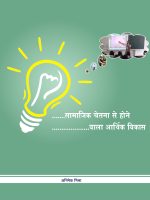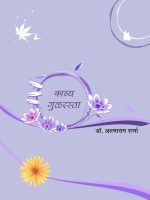The book is an attempt to analyze the construction of India by five authors in their seminal works of literature. The first of the five novels is A Passage to India by E. M. Forster published in 1924. Chronologically, it is followed by Midnight’s Children, the “Booker of Bookers” for the year 1993, published in 1981 by Salman Rushdie. The third one is The Great Indian Novel, modeled on the Great Indian Epic, The Mahabharata, published in 1989 by Shashi Tharoor. The fourth one belongs to the canon of Regional Literature and is composed by Kamleshwar. The original title is Kitne Pakistan published in 2000 and the English translation Partitions came in 2006. The book makes use of the text in Hindi for reference and quoting. There are two reasons for this: first, language is not merely a medium between the text and the reader, but also something that carries a ‘voice’. The use of Hindi by Kamleshwar has a bearing on the kind of discourse being generated, as discussed later. Secondly, language acts in a cultural context and hence the impact that it carries is properly highlighted only in the original language in which the work has been composed. A translated work is, at times, not able to convey the spirit behind the words. The quotes from the text have been given in Roman script. The last one taken is Kiran Desai’s The Inheritance of Loss, published in 2006 and the winner of the “Man Booker Prize” in the same year.
The book comprises Five Chapters: the First Chapter traces the issue of nations and nationalism and the status of India as a nation. Attempt has been made to analyze how India has been historically ‘there’ till date and also to identify the variations and commonness that define it. Then, selecting three issues from the ‘commonness’, the next three chapters have been conceived. Chapter II deals with the the Political History of India. The chapter tries to see how the five writers have represented the political history of India. Chapter III deals with the issue of Gender and tries to analyze the representation of the “self-other” relationship in the five novels. Chapter IV is concerned with Religion and the identity it creates for an individual as a member of a majority or, more troublesome, a minority group. The last Chapter tries to compare the five novels in their construct of India; and place the texts in a literary space. In the wake of this, an attempt has also been made to resolve the problematics touched upon in the First Chapter: the question of India as a nation.
I thank the Almighty for giving me strength and steering me through the entire process. I express a wholehearted gratitude to Prof. V. P. Sharma for guiding me and providing me with all the help and encouragement. A friend and a mentor, his support and faith in me went a long way in making the book a reality. I express my thanks to Dr Ashwani Rana, my M. Phil. guide and mentor since my Masters, who motivated me to complete my work. His guidance, proof-reading and critical insight gave a decisive direction to my endeavour. I was fortunate to also have the blessings and encouragement of my teachers Prof. Pankaj K. Singh, Prof. Jayawanti Dimri, Prof. Rekha, Prof. Girija Sharma and Dr Sanjana Shamshery, faculty members of the Dept of English, H. P. University, Shimla.
I take this opportunity to thank my father, Prof. H. S. Parmar, my idol, who has nurtured and groomed me and stood by me holding my hand firmly. It is just because of him that I have the courage and conviction to face the world. I owe my gratitude to my mother Mrs Rekha Parmar who patiently bore with me as I created a mess at home with my books and laptop. She has always stood rock-solid behind me throughout. My wife Vibha and son Matul have given their unwavering support and motivated me at every step, and it is their sacrifice that has bore fruit in the form of this book. I am indeed thankful to my entire family for their support.
My mother-in-law Ms Ganga deserves wholehearted thanks for her support to me and my family during my research work. A special thanks to Mr Kabir Chauhan, my Badminton coach, who ensured that with my sports I remain equally engaged with my studies. His words of wisdom and motivation have been instrumental in shaping my life and career. Last, but not the least, a whole hearted thanks to Dr Suman Dalal who has been a mother figure, constantly reminding me of my priorities in life. Her family has been a constant support through thick and thin.
The work however, is dedicated to my two lovely friends Matul and Saurabh, who passed away in separate accidents within two years of each other, and their bereaved families. They and their families had and will always have a special place in my life. This work is a tribute to my friends and a salute to the intense love and passion they both had for life.










Be the first to review “Representation of India in Select Novels”
You must be logged in to post a review.